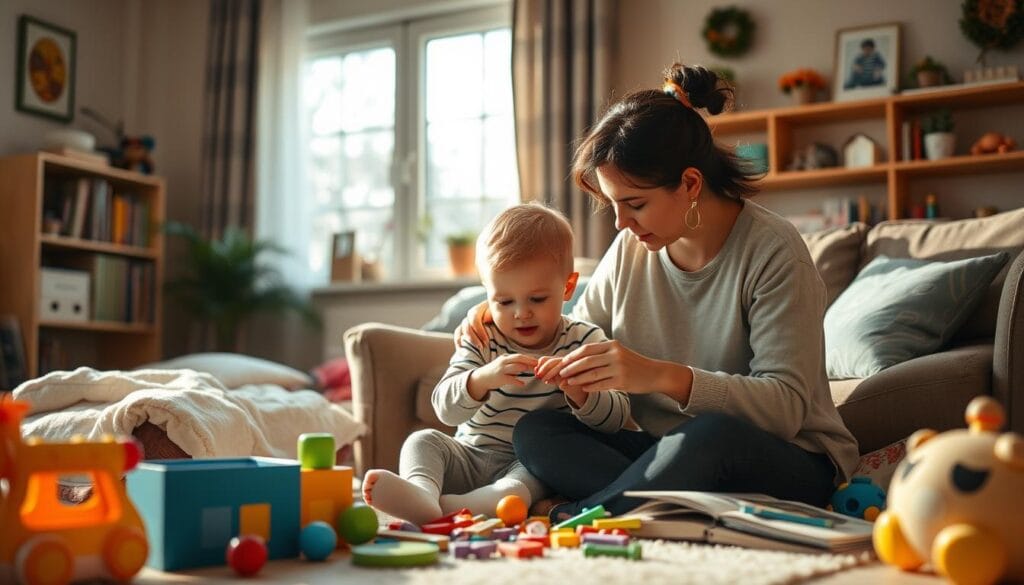Parenting with Patience and Love
Being a parent is a wild ride of emotions. There are joys, challenges, moments of pure bliss, and times when patience seems hard to find. Yet, I’ve learned that parenting with patience and love is essential for this journey.
In this guide, we’ll dive into mindful parenting. We’ll look at strategies and insights for showing unconditional love and resilience. You’ll learn how to manage stress, foster open communication, and create a nurturing space for your family to grow.

Key Takeaways:
- Discover the emotional journey of mindful parenting and how to build resilience.
- Learn to create a nurturing environment that supports your child’s growth and development.
- Explore mindfulness techniques to help stressed parents find calm and balance.
- Develop active listening skills to strengthen communication and understanding.
- Understand the power of positive discipline and emotional intelligence in building family bonds.
Understanding the Emotional Journey of Mindful Parenting
Parenting is full of ups and downs, from happy moments to tough times. Mindful parenting helps parents deal with these emotions. It’s about being aware of feelings and building strength to handle them.
This approach makes family life smoother. Parents learn to manage their emotions better. This helps them connect more with their kids.
Recognizing Parental Stress Triggers
Stress in parenting comes from many places. It can be work, sibling fights, or tough kid behaviors. Knowing what causes stress is key to handling it.
Parents can spot signs of feeling overwhelmed. This lets them use strategies to calm down. It’s a step towards a more peaceful home.
The Impact of Emotions on Parent-Child Relationships
Parents’ feelings deeply affect their kids. When parents are upset, it can make talking and understanding harder. It also affects the bond between them.
Mindful parenting teaches parents to be in tune with their feelings. This way, they can talk to their kids with patience and understanding. It makes the relationship stronger.
Building Emotional Resilience
Being emotionally strong is important for mindful parents. They learn to know and control their feelings. This helps them deal with parenting’s ups and downs.
By being emotionally stable, parents create a safe space for their kids. This helps kids grow emotionally and develop well.
The MamaZen 21-day challenge helps parents manage stress and improve patience. It offers daily affirmations and tools for mindful parenting. The goal is to make parenting more peaceful and harmonious.
| Parenting Style | Percentage |
|---|---|
| Authoritarian | 30% |
| Authoritative | 45% |
| Permissive | 20% |
| Uninvolved | 5% |
Mindful parenting focuses on emotional intelligence and strong parent-child bonds. It helps parents stay strong in tough times. By taking care of their emotions, parents create a supportive environment for their kids to grow and succeed.
The Foundation of Parenting with Patience and Love
Successful parenting starts with patience and unconditional love. These values help our children grow and reach their full potential. They create a supportive environment for them to thrive.
Unconditional love is the core of gentle parenting. It means loving our children without judgment or expectation. This love gives them the emotional safety to explore, learn, and grow. It builds a strong bond that lasts through life’s ups and downs.
Patience helps us stay calm, even when we’re stressed or frustrated. It lets us respond thoughtfully to our children’s actions. Practicing patience opens doors for growth and connection, even in tough moments.
- Research shows that when asked about the hardest thing to learn, children consistently responded with “Patience.”
- Using a visual timer, such as the Time Timer, can help children practice patience for short periods.
- Planting bulbs with a child in the fall is a great way to teach patience as they wait for the flowers to bloom.
Embracing patience and unconditional love in parenting unlocks deeper connections and understanding. These values guide us through the challenges of modern parenting. They lead us to a more fulfilling and rewarding journey with our children.
The author stresses that patience can turn high-stress times into moments of joy and connection. This shift from chaos to connection is at the heart of parenting with patience and love.
Creating a Nurturing Environment for Growth
Nurturing environments are key for a child’s emotional, social, and cognitive growth. Parents can make a supportive space by setting up peaceful areas, following routines, and encouraging open talks. This helps kids grow strong and confident.
Setting Up Peaceful Spaces
The home’s look can deeply affect a child’s happiness. Creating calm, tidy spots with natural light and soft colors helps reduce stress. Adding comfy textures and play zones makes the home feel more welcoming.
Establishing Consistent Routines
Children love knowing what to expect. Having set times for meals, sleep, and family activities gives them a sense of safety. Studies show kids in such environments behave better, feel less anxious, and manage their feelings better.
Fostering Open Communication
Good communication is vital in nurturing homes. Parents who listen well and validate their child’s feelings build trust. This strengthens their bond and helps the child understand their emotions better.
| Nurturing Environment Elements | Benefits for Children |
|---|---|
| Peaceful, clutter-free spaces | Reduced stress, enhanced well-being |
| Consistent daily routines | Improved behavior, emotional regulation |
| Open communication | Stronger parent-child bond, emotional intelligence |
By focusing on nurturing environments, parents set their kids up for success. They help them face life’s ups and downs with courage and confidence.
Mindfulness Techniques for Stressed Parents
Being a parent is rewarding but also stressful. Mindfulness techniques can help manage stress and make parenting more loving.
Deep breathing exercises are great for stressed parents. They calm the mind and body, reducing anxiety. Meditations also help, offering a way to quiet the mind and stay present.
The body scan is another useful technique. It involves focusing on the body, noticing sensations, and releasing tension. This helps parents recognize and meet their own needs before stress builds up.
| Mindfulness Technique | Benefits for Stressed Parents |
|---|---|
| Deep Breathing | Calms the mind and body, reducing anxiety and overwhelming emotions |
| Guided Meditation | Provides a structured way to quiet the inner chatter and connect with the present moment |
| Body Scan | Helps parents become more attuned to physical sensations and release held tension |
By using these mindfulness techniques daily, stressed parents can feel more in control and resilient. They learn to handle tough situations with patience and compassion. This creates a loving environment for their kids.
“When you’re a parent, you have to be calm in the midst of the chaos. Mindfulness helps me stay grounded and present, even in the most stressful moments.”
By focusing on parental self-care through mindfulness, families can grow and thrive. They build a strong foundation of love and understanding that lasts forever.
Developing Active Listening Skills in Daily Interactions
Good communication is key to strong parent-child bonds. At the core is active listening, a skill that lets us really get what our kids are thinking and feeling. By improving our listening, we make a safe space for our kids to share their thoughts and feelings.
Understanding Non-verbal Cues
Most of what we communicate is not spoken. In fact, 65% of a person’s communication is unspoken. This means we must watch body language, facial expressions, and tone of voice. Doing so helps us understand our kids’ feelings better and respond with kindness.
Practicing Empathetic Responses
Listening actively means more than just hearing what our kids say. It’s about really connecting with their emotions. By asking questions and showing we care, we keep the conversation going. The 50/70 rule helps us stay engaged without making it awkward.
Creating Safe Spaces for Expression
To get our kids to open up, we need to create a safe space. Practicing patience lets them share without being cut off. Being non-judgmental builds trust and makes our talks better.
At Sherwood High School, active listening is a big deal. Students lead talks on important topics. Workshops and meetings help parents and teachers work together. This way, Sherwood High School helps everyone improve communication and build strong bonds.
Managing Challenging Behaviors with Compassion
Parenting is rewarding but can be tough, especially with difficult behaviors in kids. By being compassionate and understanding, parents can handle tough moments well. They can keep the bond strong by knowing why kids act out and using gentle ways to guide them.
When kids get upset or act out, remember it’s usually because they’re feeling something deep inside. By listening and showing empathy, parents can calm things down. This helps kids express themselves better.
Creating a calm and loving space is key. This means having peaceful areas, regular routines, and open talks. It helps kids deal with their feelings in a healthy way.

Using positive discipline is also important. It’s about encouraging good behavior and setting clear rules. This way, kids learn from their mistakes in a supportive setting.
In the end, compassionate parenting is about seeing each child’s unique needs. With patience, empathy, and understanding, parents can handle tough times. This strengthens the bond between them and their kids.
Building Strong Family Bonds Through Positive Discipline
Positive discipline is key to strong family bonds. It balances kindness and firmness. This creates a safe space for kids to learn and grow.
Setting Healthy Boundaries
Healthy boundaries keep families in harmony. Positive discipline teaches setting clear rules and support. It builds trust and respect.
Using Natural Consequences
Positive discipline uses natural consequences, not harsh punishments. It helps kids learn from mistakes safely. This builds resilience and motivation.
Reinforcing Good Behavior
It focuses on praising good behavior. This boosts kids’ confidence and self-esteem. It strengthens family bonds.
Positive discipline needs consistency and patience. It creates a supportive environment. This fosters strong emotional connections and respect.
“Positive discipline is not about punishment, it’s about teaching. It’s about creating a safe and supportive environment where children can learn and grow, while building strong family bonds.”
The Role of Self-Care in Patient Parenting
Being a parent can be all-consuming, leaving us to forget about our own needs. Yet, self-care is crucial for maintaining patience and love in parenting.
Research reveals that 41% of parents find their role tiring, and 29% find it stressful. This stress is even higher for parents of children with special needs. It leads to more mental health issues and physical health problems.
To fight this, parents must focus on self-care. Regular exercise, a healthy diet, and a strong support network can greatly reduce stress. Asking for help is a sign of strength, not weakness. It shows we can’t handle everything alone.
| Self-Care Activity | Benefits |
|---|---|
| Exercise | Reduces stress and boosts mood |
| Healthy Eating | Provides sustained energy and overall well-being |
| Seeking Therapy | Enhances mental well-being and aids in navigating parenthood |
| Unplugging from Technology | Helps reconnect with family and reduce feelings of overwhelm |
| Occasional Pampering | Rejuvenates the mind and body, reducing stress levels |
By adding parental self-care, stress management, and a healthy work-life balance to our lives, we become better caregivers. This leads to stronger family bonds, better communication, and a positive example for our kids.

As parents, we often forget we can’t pour from an empty cup. By taking care of ourselves, we’re better prepared to face parenting’s challenges with patience, understanding, and love.
Supporting Your Child’s Emotional Intelligence
Emotional intelligence is key for a child’s growth. It helps them succeed in life. Parents can help by teaching empathy and emotional control.
Studies show kids with high emotional intelligence do better in school and have better relationships. They also feel less anxious and depressed. Parents and teachers can help by talking about feelings.
Emotion coaching is a great way to help kids. It means parents understand and help their kids with their feelings. Kids of emotion coaching parents do better in school and have stronger family bonds.
- Use strategies like modeling emotional awareness and teaching emotional vocabulary. Encourage empathy and practice active listening.
- Admit mistakes, apologize, and ask for forgiveness. This builds respect and repairs relationships.
- Give unconditional love and pay attention to your child’s feelings. This helps them grow strong and successful.
Supporting your child’s emotional intelligence helps them handle stress and build lasting relationships. It’s a skill that can be learned at any age.
“Children who feel understood and supported by their parents are more likely to have better mental health outcomes later in life.”
Emotional intelligence is a skill that can be developed at any time. It benefits both children and their parents. By focusing on your child’s emotional well-being, you’ll see how it changes their life for the better.
Conclusion
As we conclude this guide on mindful parenting, it’s clear that patience and compassion are key. These qualities help us build loving relationships with our kids. By being aware and emotionally strong, we create a supportive space for our children to grow.
Using positive discipline, listening actively, and taking care of ourselves are important. These actions help strengthen family bonds. They also teach our kids essential skills like managing emotions, communicating well, and being empathetic.
By showing these behaviors, we prepare our children for the tough teenage years. They learn to be resilient and emotionally smart. This sets them up for success in life.
The power of patient and loving parenting is huge. It makes our relationships with our kids stronger. It also improves family happiness and leaves a lasting legacy of emotional health.
We urge you to keep using the strategies from this guide. Remember to take care of your own emotions too. Your hard work will benefit your family for years to come.
Don’t hesitate to see other articles on my bloghttps://www.skillsraisingkids.com/
FAQ
What is the key focus of this guide on parenting with patience and love?
This guide focuses on mindful parenting. It shows how patience and love are key to a nurturing environment for kids.
How does this guide address the emotional aspects of parenting?
It talks about the emotional side of parenting. It covers stress triggers, how parents’ feelings affect kids, and building emotional strength.
What are the core principles of parenting with patience and love?
It dives into unconditional love and gentle parenting. It also looks at positive discipline to turn tough moments into growth chances.
How does this guide promote the creation of a nurturing environment for children?
It offers tips for peaceful spaces and routines. It also talks about open family communication to reduce stress and make kids feel secure.
What mindfulness techniques are suggested for stressed parents?
It suggests mindfulness like deep breathing and meditation. These help parents stay calm and improve their well-being.
How does this guide emphasize the importance of active listening in parent-child relationships?
It teaches better listening and understanding non-verbal cues. It also shows how to respond with empathy to help kids feel safe and build a strong bond.
What strategies are provided for managing challenging behaviors in children?
It offers ways to handle tough behaviors with compassion. It helps understand the reasons behind the behavior and respond with empathy.
How does this guide highlight the role of positive discipline in building strong family bonds?
It talks about positive discipline and setting healthy boundaries. It shows how to use natural consequences and reward good behavior to create harmony in the family.
Why is parental self-care emphasized in this guide?
It stresses the need for parents to take care of themselves. It offers self-care tips to reduce stress, prevent burnout, and be a better parent.
How does this guide address the development of emotional intelligence in children?
It gives tips on teaching emotional intelligence to kids. It includes teaching empathy, helping kids express feelings, and showing emotional control. It highlights the benefits of emotional intelligence for success.
Source Links
- The Art of Parenting: Love and Patience – https://tina-here.medium.com/the-art-of-parenting-love-and-patience-94edfa91a775
- How To Avoid Losing Your Patience With Your Kids – Jane Erica – https://janerica.com/how-to-avoid-losing-your-patience-with-your-kids/
- MamaZen: The Path to Mindful and Empowered Parenting – https://podcasts.apple.com/us/podcast/mamazen-the-path-to-mindful-and-empowered-parenting/id1771645717
- The Journey of Parenthood: Mastering the Art of Parenting with Grace and Humor – https://medium.com/@mayanixonpage/the-art-of-parenting-navigating-the-journey-with-grace-and-humor-becf13fa5948
- » Mindful Parenting – https://alolaeducation.com/product/mindful-parenting/
- Teaching Patience: Love is Patient – https://bekindcoaching.com/blog/teaching-patience/
- From Chaos to Connection: Building a Stronger Bond with Your Child – https://christina2023.medium.com/from-chaos-to-connection-building-a-stronger-bond-with-your-child-3bbfcdc230d3
- Create a safe and nurturing environment for your child – OHF – https://www.oakhealthfoundation.org/why-safe-and-nurturing-environments-matter-for-your-childs-growth/
- The Importance of a Nurturing Environment | Montessori School of Downtown – https://www.montessoridowntown.com/the-importance-of-a-nurturing-environment/
- Mindful Parenting – Child Mind Institute – https://childmind.org/article/mindful-parenting-2/
- Mindful Parenting: Stay Present & Connected Daily – https://www.nurturingparenting.com/blog/mindfulness-for-parents-techniques-to-stay-present-in-busy-lives/
- 7 Active Listening Techniques to Practice in Your Daily Conversations – https://www.verywellmind.com/what-is-active-listening-3024343
- Empowering Communication with Children: Embracing the Art of Listening – – https://sherwoodhigh.com/blogs/empowering-communication-with-children-embracing-the-art-of-listening/
- The Importance of Developing Listening Skills for Kids: Tips and Strategies – Baby Steps Daycare & Preschool in Queens NY – https://nybabysteps.com/blog/listening-skills-for-kids/
- How to Harness Patience, Expectations, Flexibility, and Relationship in Parenting for a Smoother, Less Stressful Life with Your Children – https://deliberateowl.com/blog/how-to-harness-patience-expectations-flexibility-relationship-parenting-smoother-less-stressful-life-children
- How to Handle Risky Behavior with Compassionate Parenting – Esse Health Pediatrics – https://pediatrics.essehealth.com/about-us/in-the-news/handle-risky-behavior-with-compassionate-parenting/
- The Power of Positive Discipline – https://bekindcoaching.com/blog/positive-discipline/
- What Are Some Ways to Build Strong Family Bonds? – https://thearkgroup.org/what-are-some-ways-to-build-strong-family-bonds/
- Self Care for Parents: 13 Essential tips — Talkspace – https://www.talkspace.com/blog/self-care-for-parents/
- Keeping It Cool: Why We Lose Patience With Our Children – https://www.linkedin.com/pulse/keeping-cool-why-we-lose-patience-our-children-atara-malach-bzbnf
- How to Raise Emotionally Intelligent Kids – https://www.psychologytoday.com/us/blog/what-mentally-strong-people-dont-do/202409/cultivating-emotional-intelligence-in-kids-a
- Emotional Intelligence Creates Loving and Supportive Parenting – https://www.gottman.com/blog/emotional-intelligence-creates-loving-supportive-parenting/
- Nurture Your Child’s Emotional Development | Redwood Pediatrics – https://redwoodkids.com/blog/how-to-nurture-your-childs-well-being/
- Parental Ambivalence Is Real and Complicated and We Need to Talk About It More – Tribeca Therapy – https://tribecatherapy.com/7112/parental-ambivalence-is-real-and-complicated-and-we-need-to-talk-about-it-more/
- The Power Of Patience: The Importance Of Guiding Your Teen Through Emotional Growth Without Losing Your Cool – Ashburn Psychological and. Psychiatric Services – https://www.ashburnpsych.com/power-of-patience/







